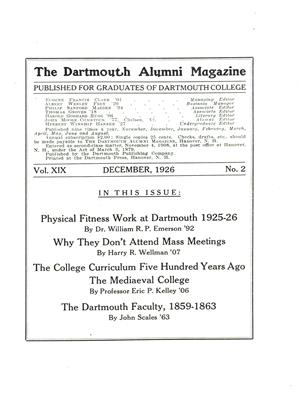At its meeting on October 25, the faculty adopted the following resolutions: WILLIAM JEWETT TUCKER
The faculty of Dartmouth College in recording its veneration and affection for President William Jewett Tucker recognizes the impossibility of recounting the wide range of his services.
We desire simply to express our deep appreciation of his generous interest in the ideals of the teacher and quick sympathy with his difficulties; his rare insight into the heart of the man and of his problem, whether student or teacher; and his extraodinary power to draw from each the best he had to give.
We who lived by his side as students or teachers, listened to him in chapel, worked with him in faculty, committee meetings, and personal conferences, and followed his leadership, put on record our grateful recognition of his wisdom, tolerance, courage, and vision, as a great educator who embodied his ideals in the College.
Herbert Darling Foster George Dana Lord William Patten Committee.
PROFESSOR JOHN KING LORD
Professor Lord graduated from Dartmouth College in 1868. A year later he returned as a tutor of Latin, and from then until his death in 1926, a period of fifty-seven years, he was in the service of the College either as a member of the faculty or as a trustee. He was associate professor of Latin and rhetoric from 1872 to 1880, professor of oratory and belles lettres from 1880 to 1882, associate professor of the Latin language and literature from 1882 to 1892, and Daniel Webster professor of Latin from 1892 until his retirement in 1916. His genius for clear thinking and his wonderful power of lucid and orderly exposition made him one of the most effective teachers the College has ever had. And these same qualities, together with unusual wisdom and foresight, made him a tower of strength in the administration of the College. He was always one of the chief advisers of the president, and himself served as Acting President in 1892 to 1893, and as Acting President of the Faculty from 1893 to 1909. In spite of the many activities and responsibilities of these busy years, he still found time to carry on his studies in his special subject, and as editor or author published various books and articles of distinction. Besides books on classical, subjects he completed and edited Frederick Chase's History of Dartmouth College, and himself wrote the second volume, a monumental work of painstaking and accurate investigation, a labor of love, and perhaps his greatest contribution to the service of the College.
At the time of his death Professor Lord was engaged upon the collection of material for a complete history of Hanover.
A year after his retirement from the faculty he became a member of the board of trustees and, with his long experience in the College and his personal knowledge of conditions, became an important factor in the deliberations of that body.
Upon the organization of the New ii-nglana Certificate Board Professor Lord became the Dartmouth representative, and for many years contributed greatly to the improvement of the certificate system throughout New England. He was also one of the original members of the Classical Association of New England and active in its affairs.
In community service Professor Lord was generous and public-spirited. The church was strengthened by his constant attendance and whole hearted service. Its present exceptionally liberal constitution is due in no small degree to his progressive ideas.
Professor Lord was a member of the board of trustees of the Mary Hitchcock Hospital from its foundation in 1889 to 1916, and at the death of Hiram Hitchcock in 1900 he became president of the board. His constant suPervision of the details of administration and his successful efforts to secure funds were large factors in carrying the hospital through its most crucial period.
Professor Lord was for many years a member of the village school-board. His service there, in a time when there was no superintendent of schools, involved not only a responsible part in shaping the curriculum of the schools and in finding teachers, but the constant personal supervision of certain of the schools. To this work he brought his rare gifts as a teacher, and secured results which would have been quite impossible without his generous and able direction.
Those who were most closely associated w Professor Lord feel that it would be difficult to exaggerate his unusual qualities. He was a wise man in the best and broadest sense of the word. He was a kindly man, always keenly interested in the happiness and ambitions of his associates. And he was a modest man always working for the College, never for himself; always making light of his own abilities and accomplishment, a man capable, perhaps, of even more responsible work than that which fell to his lot to do.
Harry E. Burton Committee.
 View Full Issue
View Full Issue
More From This Issue
-
 Lettter from the Editor
Lettter from the EditorEditorial Comment
December 1926 -
 Article
ArticleALUMNI ASSOCIATIONS
December 1926 -
 Article
ArticleTHE COLLEGE CURRICULUM FIVE HUNDRED YEARS AGO THE MEDIEVAL COLLEGE
December 1926 By Professor Eric P. Kelly '06 -
 Article
ArticlePHYSICAL FITNESS WORK AT DARTMOUTH 1925-26
December 1926 By William R. P. Emerson, M. D. -
 Article
ArticleC. F. RICHARDSON'S TRIBUTE TO THE GREAT PRESIDENT
December 1926 -
 Article
ArticleWHY THEY DON'T ATTEND MASS MEETINGS
December 1926 By Harry R. Wellman '07
Charles D. Adams
-
 Article
ArticleREPORT OF THE MAY CONFERENCE OF TEACHERS
May, 1909 By Charles D. Adams -
 Books
BooksGreat Companions.
NOVEMBER 1927 By Charles D. Adams -
 Books
BooksGREEK THOUGHT IN THE NEW TESTAMENT.
AUGUST, 1928 By Charles D. Adams -
 Books
BooksHISTORY OF AMERICAN ORATORY
November 1928 By Charles D. Adams -
 Books
BooksA SON'S PORTRAIT OF FRANCIS E. CLARK
February, 1931 By Charles D. Adams








